- Home
- Eric Nylund
All That Lives Must Die mc-2
All That Lives Must Die mc-2 Read online
All That Lives Must Die
( Mortal Coils - 2 )
Eric Nylund
Eric Nylund. All That Lives Must Die
(Mortal Coils — 2)
ACKNOWLEDGMENTS
My gratitude to the following people for their help, confidence, and being some of the best friends a writer could have: Richard Curtis, Tom Doherty, Alexis Ortega, Eric Raab, and John Sutherland.
EDITOR’S NOTE
We at Tor have received numerous requests to publish the many-volume set of Gods of the First and Twenty-first Century, as well as the notorious Golden’s Guide to Extraordinary Books and, of course, the apocalyptically difficult to obtain and decipher Mythica Improbiba. At this time, however, the rights for these rare books (and others within All That Lives Must Die) reside with academic institutes, religious organizations, and private collectors. While excerpts have been graciously provided for Mr. Nylund’s footnotes, the remaining bodies of these works are fated to remain in obscurity (and please, please stop sending me e-mail and letters about this).
ERIC RAAB
Editor, Tor Books
New York
QUEEN GERTRUDE
Do not for ever with thy vailed lids
Seek for thy noble father in the dust:
Thou know’st ’tis common; all that lives must die,
Passing through nature to eternity.
HAMLET
Ay, madam, it is common.
QUEEN GERTRUDE
If it be,
Why seems it so particular with thee?
WILLIAM SHAKESPEARE
Hamlet (act 1, scene 2)
Prologue
WHAT I DID OVER MY SUMMER VACATION
by Fiona Paige Post
This summer, my brother and I joined the League of Immortals. One minute, I’m a homeschooled hermit; the next, I’m a fledgling goddess-in-training and the newest member of the Order of the Celestial Rose.
You’d think, being an actual goddess, I’d end up with killer Botticelli hair. No luck there, I’m afraid.
Let me start at the beginning.
Gods and fallen angels exist.
And they don’t get along.
Despite this, sixteen years ago-Atropos, the Eldest Fate, and Lucifer, Prince of Darkness, fell in love.
They’re my mother and father.
When my twin brother and I were born, my mother didn’t want either side of the family finding us. Neither the gods nor fallen angels treat their nieces and nephews well: turning them into animals, trees, weeping stones, or casting them into pits of eternal torture. Nice, huh?
So for fifteen years, my brother, Eliot, and I were hidden from our relatives and raised to think we were nerdy and normal.
The Immortals found us, however, and to decide which family we belong to-diabolical or divine-they subjected us to three life-or-death tests (what they prosaically called heroic trials).
Long story short: We passed their tests and came out divine.
It wasn’t all happy endings, though. My father’s side of the family still wanted us. The Infernal Lord of All That Flies, Beelzebub, almost killed us and dragged our souls to Hell. That ended in a huge fight in Del Sombra (where we used to live); I killed Beelzebub, and the entire town burned to the ground.
Our father said he still wants to get to know us, but I don’t think Mother is going to let him.
I agree. I don’t trust him.
After all this, my brother, mother, great-grandmother, and I went to San Francisco, and we’ve barely moved into a new place in time for school.
It has been a tumultuous summer. I just want to settle down and begin at the Paxington Institute so I can figure out how I fit into this new world where legends are real.
September 22, San Francisco
________
WHAT I DID OVER MY SUMMER VACATION
by Eliot Zachariah Post
This summer, I found out that my father and mother are alive. My sister and I spent our entire lives thinking they were dead, told that they were drowned in a boat accident.
One more thing: Our mother is the goddess Atropos, and our father is Lucifer, Prince of Darkness.
Mother’s side of the family are gods and goddesses in the League of Immortals. They smile at you, but you can see them thinking behind those smiles, wondering how you fit in their orderly view of the world.
And Dad’s side of the family? Not so wonderful, either. They tried to kill me and my sister, Fiona. They also managed to poison Fiona with a box of magical chocolates.
Besides our parents, we discovered another important thing this summer: We inherited special powers from our families.
Fiona can cut with a thread stretched between her fingers, kind of like a wire cheese slicer. When I say “cut,” I mean she can cut through anything when she puts her mind to it: cinder block walls, a solid steel vault door, even a person. I’m not sure how she keeps the thread from cutting off her fingers. She doesn’t talk much about it.
I think it scares her. I know it scares me.
I learned how to use the violin. My father showed me the basics, but I play like I’ve been practicing all my life. . and my music makes things happen. Magical things, like conjuring a fog filled with ghosts or charming a million hungry sewer rats so they wouldn’t eat me.
Then, once, I got a glimpse of the end of the world. I played a song about the end of things, which I call “The Symphony of Existence.” If that sounds dangerous, it was, but I had to, believe me, because I was facing the Infernal Beelzebub, Lord of All That Flies, who was trying to part my right side from the left with a gigantic obsidian knife.
When I played that song, I felt the world come apart around me, and I heard the death rattle of the universe as protons and neutrons and electrons tore into smaller subatomic bits. . and then into void.
I still hear it in my dreams. It worries me sometimes.
I’ve learned a lot this summer, but I’m ready to learn more at Paxington and find out what I’m supposed to be doing with these amazing and dangerous gifts.
September 22, San Francisco
________
Eliot watched and worried as his sister read his essay.
Her brows furrowed.
Eliot knew people liked his writing style better, but Fiona was good at putting facts together and impressing people with her logic. Besides, her essay pretty much told the entire story of what had happened to them this summer. He hoped the teachers at Paxington read his paper first.
“Well?” he asked her. “What do you think?”
“Just a second.” She held up a hand, rereading from the top of the page.
Eliot paced. Sunlight filtered into his new bedroom from the garden. Outside were rows of pink and yellow daisies, and beyond, he could make out misty San Francisco Bay-a spectacular view.
Inside their new house, however, especially in his bedroom, the view was not so spectacular-crowded with mountains and mazes of cardboard U-Haul boxes, each one filled with a hundred pounds of books. If there was the slightest shudder from the San Andreas Fault, Eliot knew he’d be buried under an avalanche of Chaucer, Twain, and Shakespeare.
Fiona looked up from his essay and brushed her long, dark hair from her face. “You don’t have all the facts,” she said. “You should have added something about your girlfriend.”
“She wasn’t my girlfriend,” Eliot replied.
Fiona meant Julie Marks, the girl he had met this summer, the girl he had liked an awful lot. She’d even kissed him. . but then ended up leaving. Every time he thought about her, he felt that he had done something to drive her away. Fiona had never liked Julie, for some reason.
He glared at his sister, suddenly irritated.
>
Then he understood: Fiona wasn’t trying to be mean on purpose. She couldn’t help it. Anyone would be a little nasty if they looked the way she did this morning.
Normally, he and his sister had to wear their great-grandmother’s handmade clothing-bad enough because it looked like something out of the “wrong clothes that didn’t fit” catalog.
Today was worse. They had on their new Paxington school uniforms.
The new clothes looked fine when Eliot and Fiona had first gotten them: khaki slacks for him, pleated tartan skirt for his sister, white button-down linen shirts and navy blue blazers for them both. No ties, thank goodness-they probably would have strangled themselves. Fiona had stockings and flats. He had leather loafers with no heels that made him look (if possible) shorter than usual.
All well and good, Eliot supposed. . if you actually knew how to wear such things.
But Fiona had never owned, let alone worn, a pair of stockings. Her skinny legs looked like crumpled caterpillars that had cocooned themselves and died there. Add to this that no one in the Post family knew how to use an iron (or at least, no one was willing to let the doddering 104-year-old Cecilia near an iron), and they both ended up looking like they had slept in their new uniforms.
Eliot shifted underneath his blazer-one size too big for him-and felt just as uncomfortable and annoyed as his sister must. He exhaled a great sigh, smelling something off. Maybe his clothes should have been washed first.
This was just what they needed today. He ran a hand through his hair, whose cowlicks, as usual, resisted any attempts at grooming. Not only would they have to deal with dozens of strange new students on their first day at school, but they also looked like dorks.
Eliot tapped Fiona’s essay and told her, “I see you didn’t mention Robert, either.”
“What’s to mention?” Fiona said. “We haven’t seen him in two months.”
Robert Farmington was the boy Fiona had met this summer. They weren’t exactly boyfriend and girlfriend, but there had been something between them. He had been a Driver for their uncle Henry in the League of Immortals. . before Robert got fired.
Fiona had a far-off look in her eyes-which sharpened to a glare that she aimed directly at Eliot. “Cupulate temporal cranium?” she asked.
This was the game they played to get back at each other: vocabulary insult.
Eliot ran over the line in his head, trying to figure out what she had meant. Brain. . cranium. . something about his head.
Temporal? Did that mean “time”? No, the bone on the side of the head was the “temporal” part of the skull.
But cupulate? He didn’t have a clue. . unless she was making it simple in order to throw him. Cupulate could just mean “cup shaped.”
She meant his ears.
They stuck out, and she knew how sensitive Eliot was about them.
“At least I need a cup, handles or not,” Eliot replied, “to hold my brain.”
That was a weak comeback, so he added: “Countenance of verruciform[1],” and then with a sweeping gesture down to her toes, “vermiform locomotion borne[2].”
Fiona puzzled over that a moment, and then her face reddened.
Good. It was pretty easy to figure out. Eliot had wanted her to get it.
“No fair,” she said. “That’s two vocabulary words at once.”
She said this, despite having just used two herself.
“Breakfast!” Cee called from the kitchen.
Eliot sniffed the air and realized that the “off” smell he’d detected before was stronger, and now recognizable-half-cooked oatmeal and carbonized bacon.
Fiona spotted Eliot’s rusty alarm clock in the corner. Her eyes widened. “We’re going to be late!” She rushed out, bumping a tower of boxes, almost knocking them over.
Of course they were going to be late for their first day of school. That would be the perfect start to this morning. Eliot scrambled after her. There was no way she was getting to the kitchen first to pick out the few edible bits from Cee’s cooking.
SECTION I — THE FIRST DAY OF SCHOOL
1 NEW RULES
Fiona scrambled over the cool terra-cotta tiles and skidded to a halt in their new dining room. Bookshelves and half-built china cabinets were constructed along the walls. Unlike their old apartment in Del Sombra, this room had enough space for shelves without crowding the glorious picture window and its built-in seats.
The window framed the Golden Gate Bridge in the distance. Early-morning light spilled through and made the plaster cornices of the room glow gold.
Cee carried in two trays from the kitchen. Their 104-year-old great-grandmother wore a brown dress with lace ruffles and looked like she belonged in a nineteenth-century tin daguerreotype with her hair pulled up tight and pinned in place. Some things would never change. That was okay. Cee, shaking and smiling, was always there for them.
“Let me help,” Fiona offered.
“No, no, my darlings,” Cecilia replied. “Just sit and eat. You have a momentous day ahead of you.”
With trembling arms, she set a platter of smoking black bacon on the table, and another platter with bowls of lumpy half-cooked oatmeal.
“Don’t you two look splendid in your uniforms?” Cee kissed Eliot on the cheek and then Fiona. It felt like the brush of dry leaves. She then went back into the kitchen.
“Thanks, Cee,” Fiona said, and tugged on her stockings. How could something so tight fit so poorly?
“Thanks,” Eliot murmured. He sat and dragged a bowl closer, grimacing.
Fiona shot him a look. Cee did try. It wasn’t her fault she no longer had a sense of smell or taste.
Eliot stirred the mixture in front of him in an attempt to make it palatable.
She pulled a bowl closer as well and segregated the inedible bits from the stuff that looked like it could be choked down.
Sometimes having a severed and only partially repaired appetite had its advantages.
Fiona spooned the lumps into her mouth. It tasted like sawdust. . but then almost everything did these days. She knew she had to force herself to eat, or she’d faint from malnutrition.
So she chewed until the oatmeal could be swallowed without gagging.
In fact, if she didn’t force herself to feel something, she didn’t feel much of anything. That was because when she’d cut her appetite to save herself from those addictive Infernal chocolates. . she cut deeper. . cut part of the connection to her emotions. Like what she felt for Robert. It was so unclear. Did she really miss him? Or had it been some crush brought on by their shared adventures this summer?
No, there was something there.
It was complicated, because she was now part of the League of Immortals, and Robert had just been fired by the League. Fired meaning that some Immortals had a grudge against him, and if they ever saw him, it might be the end of his life.
How could she be with someone who was endangered by her very presence?
She watched Eliot struggle with his oatmeal, his face contorting through various shades of discomfort and strangulation as he swallowed. She did feel some tiny punitive pleasure from that.
Vermiform locomotion borne, huh? She tried to smooth her stockings again, but it was hopeless. Her legs did look like two wrinkled worms.
Outside, fog covered the sun. The golden light tinged iron gray, and the temperature in the room dropped.
Audrey descended the spiral staircase that led to her office. She joined them at the table.
She wore faded jeans, chamois soft boots, and a deep blue silk blouse that matched the color of San Francisco Bay. Diamond studs adorned her earlobes and flashed cold rainbows upon her throat and slicked-back silver hair. She carried a slender briefcase. She was the picture of grace and understated elegance, and looked perfectly at ease in their new surroundings.
But it wasn’t only the new clothes that made Audrey look different today.
When Fiona came back from her summer vacation, this woman was no longer the
“grandmother” she had known for the last fifteen years. That masquerade was over. She was her mother now and the goddess Atropos, and both titles seems equally perplexing to Fiona.
“Good morning, Audrey,” Fiona said. She couldn’t call her Grandmother anymore, and the word Mother caught in her throat, so Fiona had settled on Audrey.
“Good morning,” Eliot echoed.
“Good morning, children,” Audrey replied. She poked carbonized bacon with a fork and then decided to pour herself a glass of juice. “I’ve ordered the books you’ll need for Paxington. . assuming you do well enough on the entrance examinations today. I have every confidence that you will.”
If she had every confidence, then why even mention it?
Those books-which would join the thousands and thousands already here-had to be ordered because many of their books had pages crossed out to the point of unreadability. Those were the books on mythologies, legends and folklores, ghost stories, tales of demons and gods-all omitted because their mother had the notion that she could hide Fiona and Eliot from the truth. . and hide the truth from them.
“I guess. .,” Eliot started, but his voice died. He swallowed and tried again. “I guess that means Rule Fifty-five doesn’t apply anymore?”
Rule 55 was one of the 106 household rules that governed every aspect of Fiona’s and her brother’s lives. It was the “nothing made up” rule.
RULE 55: No books, comics, films, or other media of the science fiction, fantasy, or horror genres-especially, but not limited to, the occult or pseudosciences (alchemy, spirituality, numerology, etc.) or any ancient or urban mythology.
Audrey looked at Eliot as if he spoke a language she didn’t understand.
How typical. Audrey was very good at telling them what to do-not so good at listening to anything they had to say.

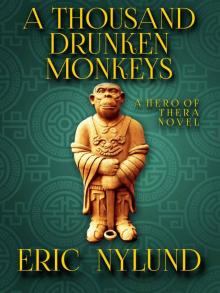 A Thousand Drunken Monkeys: Book 2 in the Hero of Thera series
A Thousand Drunken Monkeys: Book 2 in the Hero of Thera series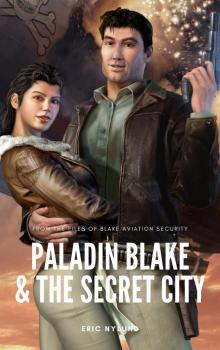 Paladin Blake & The Secret City
Paladin Blake & The Secret City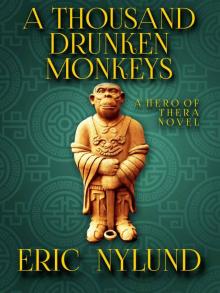 A Thousand Drunken Monkeys
A Thousand Drunken Monkeys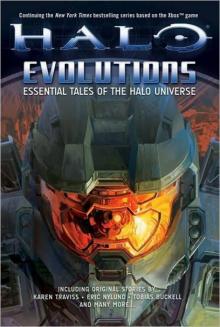 Halo: Evolutions - Essential Tales of the Halo Universe
Halo: Evolutions - Essential Tales of the Halo Universe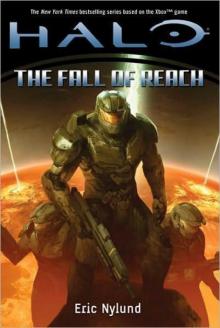 Halo: The Fall of Reach
Halo: The Fall of Reach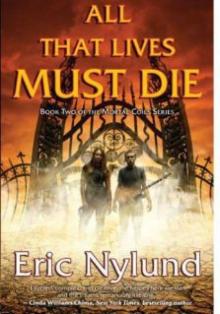 All That Lives Must Die mc-2
All That Lives Must Die mc-2 First Strike
First Strike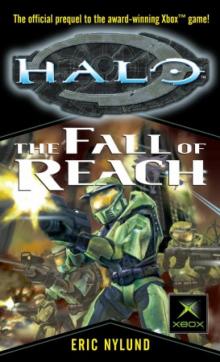 The Fall of Reach h-1
The Fall of Reach h-1